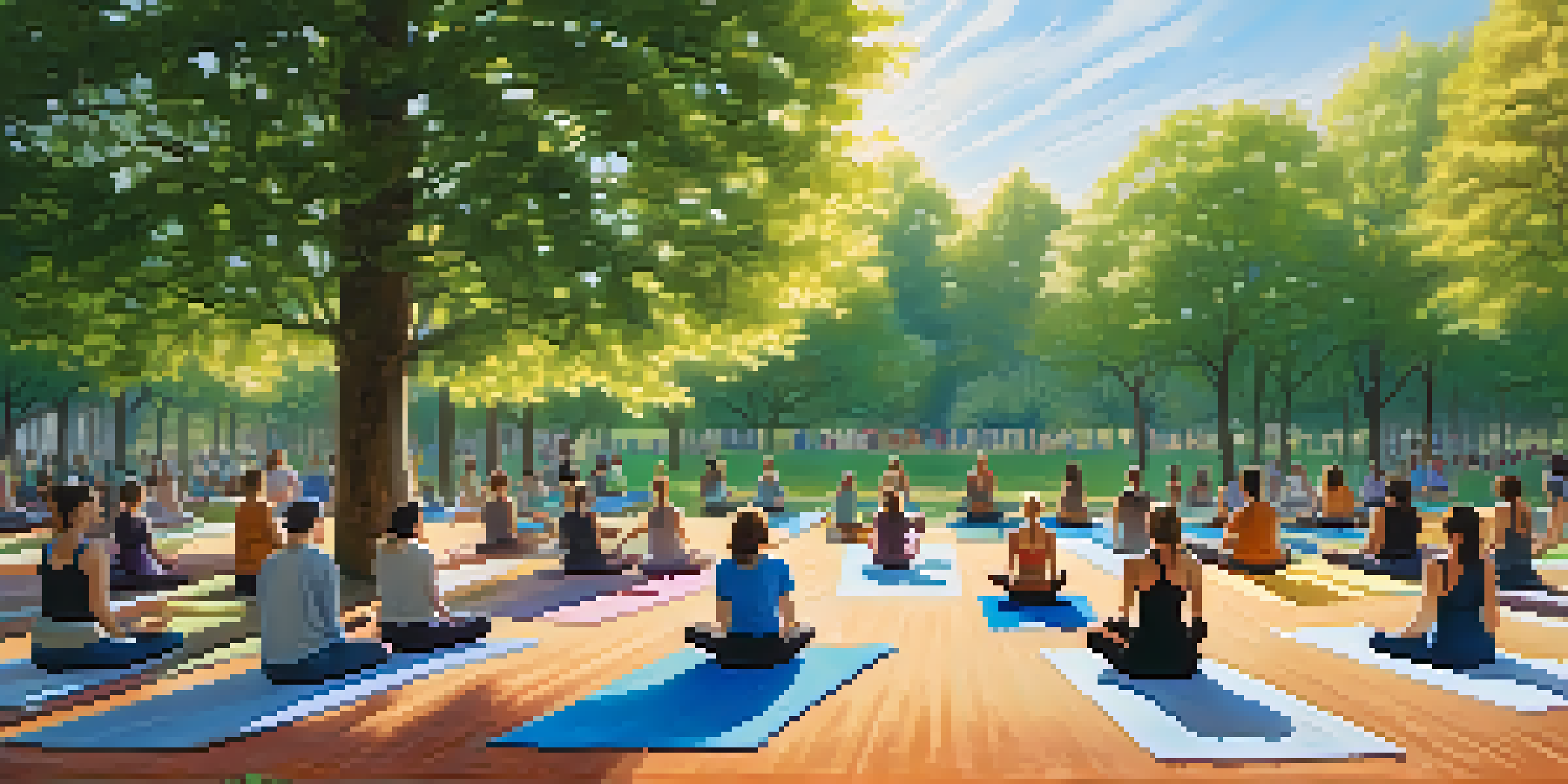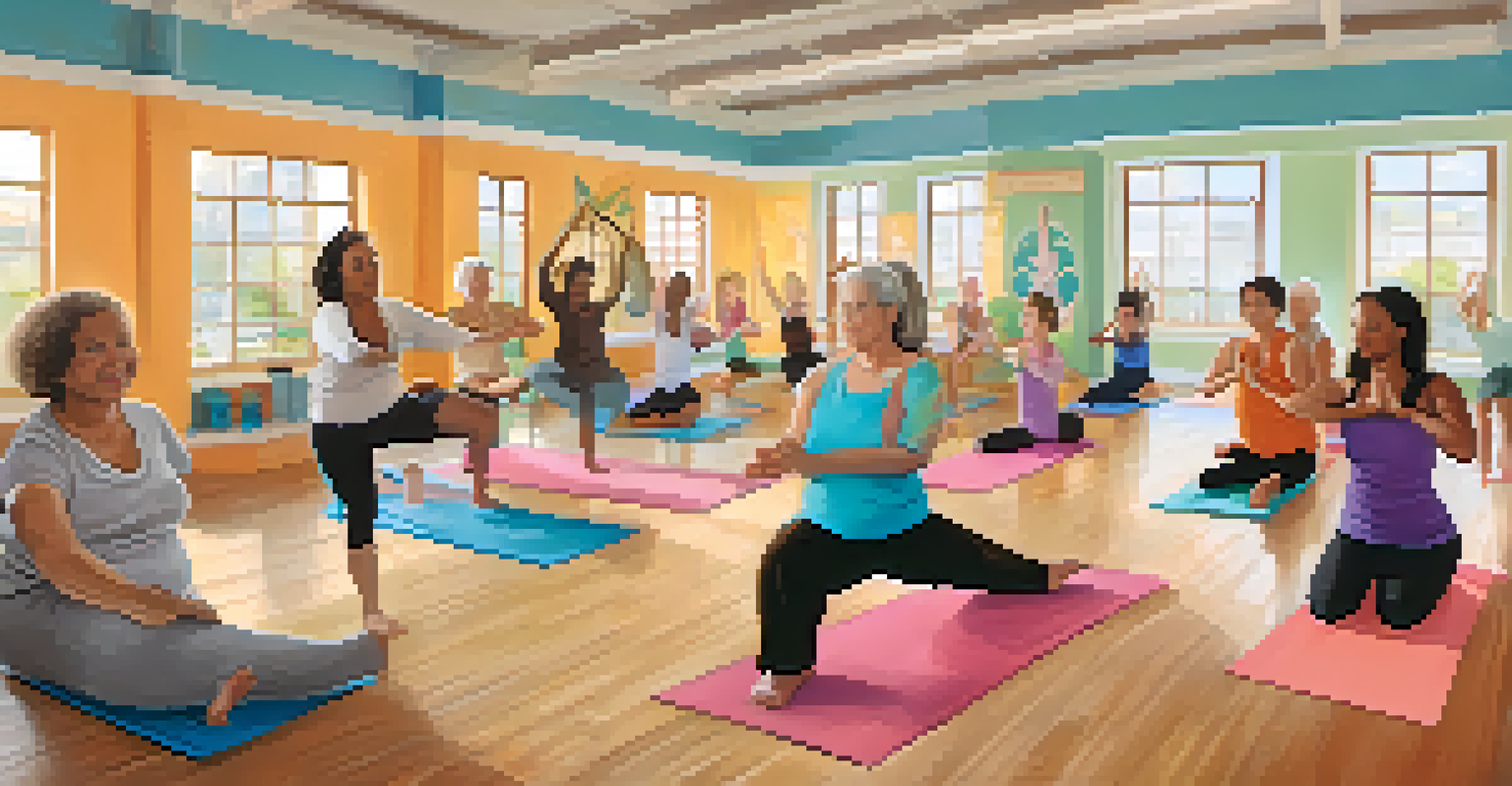Integrating Yoga into Community Organizing for Justice

The Intersection of Yoga and Social Justice
Yoga is often seen as a personal practice centered on self-improvement, but it can also serve as a powerful tool for social justice. When we integrate yoga into community organizing, we create a space that encourages mindfulness, resilience, and unity. This fusion allows activists to address their mental and emotional well-being while tackling systemic issues.
You cannot shake hands with a clenched fist.
Communities facing injustice often experience stress and trauma, which can hinder their effectiveness in organizing. By incorporating yoga, individuals can cultivate a sense of calm amidst chaos, allowing them to approach challenges with clarity and purpose. This holistic approach nurtures both personal and collective growth.
Furthermore, the principles of yoga—such as non-violence, truthfulness, and self-awareness—align closely with social justice values. This synergy can empower activists to not only fight for justice externally but also to cultivate a healthy internal landscape, fostering a more sustainable movement.
Mindfulness as a Tool for Activism
Mindfulness, a key component of yoga, encourages individuals to stay present and aware of their thoughts and feelings. In the context of activism, this practice can help organizers remain grounded, even when facing intense opposition or emotional turmoil. By focusing on the present, they can make more thoughtful decisions that align with their goals.

For instance, during protests or community meetings, mindfulness can help participants manage anxiety and maintain focus on their mission. This heightened awareness can lead to more effective communication and collaboration among group members. Imagine a group of activists entering a tense situation with a sense of calm—that can dramatically shift the dynamics.
Yoga Enhances Activism's Impact
Integrating yoga into community organizing fosters mindfulness and resilience, empowering activists to address both personal well-being and systemic issues.
Moreover, regular mindfulness practice fosters empathy, which is essential in building coalitions and understanding diverse perspectives. By integrating mindfulness into their routines, community organizers can enhance their emotional intelligence, making them more effective advocates for justice.
Building Community Through Shared Practices
Yoga has a unique ability to bring people together, creating a sense of belonging and community. Group yoga sessions can serve as a platform for individuals to connect on a deeper level, fostering trust and solidarity among organizers. This shared practice helps strengthen relationships, which is crucial in any movement for change.
In a gentle way, you can shake the world.
When people come together to practice yoga, they not only share physical space but also emotional and spiritual experiences. This collective energy can be a powerful motivator, reinforcing the commitment to their cause. It's similar to how a team sports activity builds camaraderie—yoga creates a shared goal of well-being and resilience.
Additionally, these community sessions can be spaces for education and dialogue. People can discuss strategies for activism, share personal stories, and brainstorm solutions, all while grounding themselves in the calming practice of yoga. This approach cultivates a nurturing environment where ideas can flourish.
Fostering Resilience in Activists
Activism can be exhausting and emotionally draining, making resilience a crucial trait for organizers. Yoga practices, particularly those focusing on breathwork and meditation, can help build this resilience. By teaching individuals how to manage stress and recover from setbacks, yoga equips activists with the tools they need to keep pushing forward.
For example, a community facing a setback in their justice campaign can benefit from a yoga session that emphasizes restorative poses and mindfulness techniques. This allows members to process their feelings and find renewed strength. The restorative aspect is akin to recharging a battery—essential for maintaining energy levels.
Mindfulness Builds Stronger Coalitions
Practicing mindfulness helps activists remain grounded and empathetic, which is essential for effective communication and collaboration in social justice efforts.
Moreover, cultivating resilience through yoga can lead to a more sustainable approach to activism. Rather than burning out, individuals learn to balance their passion for justice with self-care, ensuring they can continue their work for the long haul. It’s about finding that sweet spot between activism and personal well-being.
Yoga as a Method for Conflict Resolution
Conflict is an inevitable part of community organizing, but yoga can provide tools for effective resolution. Practices such as mindful communication and active listening can help individuals navigate disagreements with empathy and respect. This approach aligns with yoga's emphasis on compassion and understanding.
For instance, during tense discussions, incorporating moments of deep breathing can help participants pause and reflect before responding. This simple act can diffuse heightened emotions and lead to more constructive dialogues. It’s like hitting the reset button in a heated discussion, allowing for a clearer perspective.
Additionally, yoga can foster a culture of collaboration rather than competition. By encouraging a mindset focused on unity and shared goals, community organizers can work through conflicts more effectively. This collaborative spirit is essential for building strong, resilient movements.
Creating Inclusive Spaces Through Yoga
Inclusion is a cornerstone of social justice, and yoga can play a significant role in creating welcoming spaces for all. By promoting accessible yoga practices that cater to diverse bodies and experiences, community organizers can ensure everyone feels valued and supported. This inclusivity strengthens the movement as a whole.
For example, offering classes that are specifically designed for marginalized communities can empower individuals who may not typically engage with yoga. This approach not only broadens participation but also reinforces the message that everyone deserves a voice in the fight for justice. It’s about breaking down barriers and building bridges.
Self-Care Sustains Long-Term Activism
Prioritizing self-care through yoga prevents burnout and promotes a healthier, more balanced approach to sustained activism.
Moreover, inclusive yoga spaces can serve as a microcosm of the larger community. By practicing together, individuals can learn from each other’s experiences and perspectives, fostering a culture of understanding and acceptance. This foundation of inclusivity can extend beyond the mat and into their activism.
Sustaining Activism Through Self-Care
Self-care is vital in sustaining long-term activism, and yoga offers a plethora of self-care practices. By encouraging individuals to prioritize their well-being, yoga helps prevent burnout and promotes a healthier approach to activism. It's not just about fighting for change; it's also about maintaining personal health.
For instance, regular yoga practice can help individuals develop a routine that balances activism with self-care. This balance is crucial, as it allows activists to recharge and come back to their work with renewed energy and passion. Think of it as tending to a garden—without care, it can't thrive.

Ultimately, integrating yoga into community organizing creates a holistic approach to activism. It recognizes that the well-being of individuals is intertwined with the health of the movement. By fostering a culture of self-care, communities can sustain their efforts and continue to fight for justice effectively.